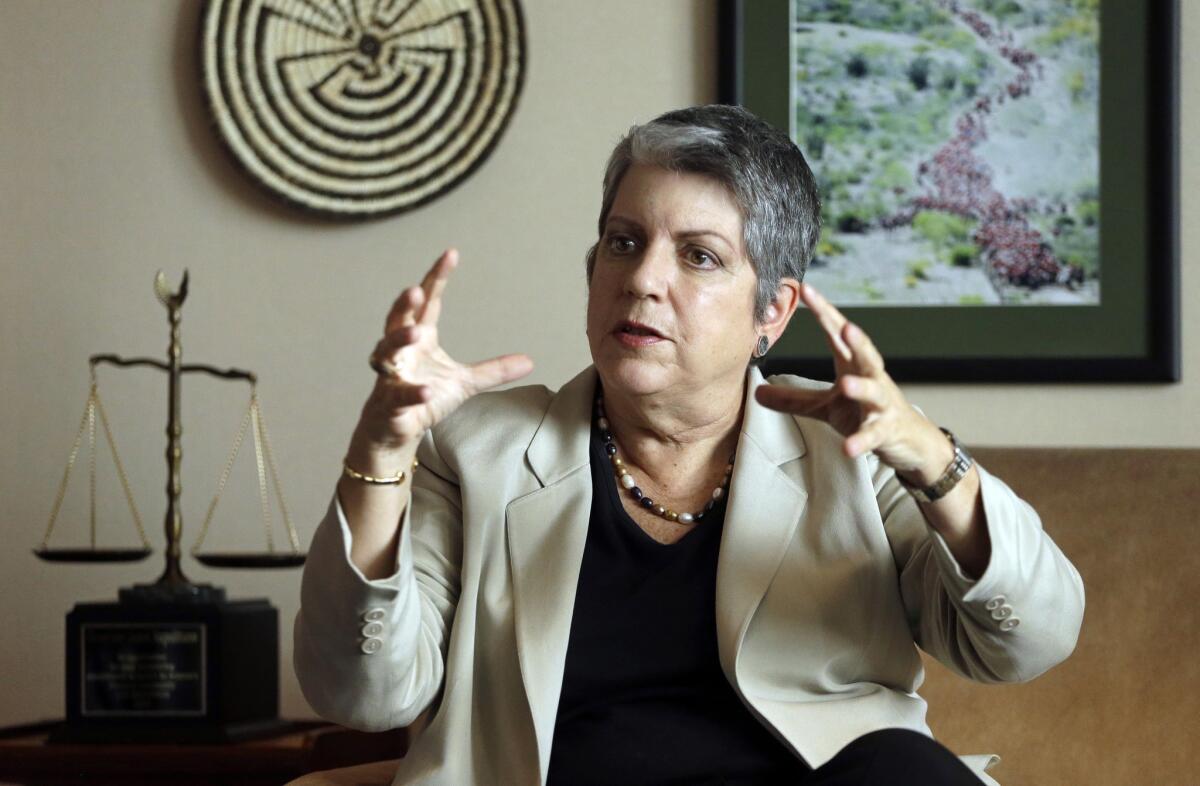Higher Learning: As UC regents debate tuition hike, Brown may hold sway

- Share via
The UC regents begin deliberations next week on a proposal to raise tuition by as much as 5% over each of the next five years. And although each member ostensibly has an equal vote, one may well have the strongest sway on public opinion and UC finances: Gov. Jerry Brown.
Behind all the talk about annual percentages, philosophical differences between the governor and UC officials will probably fuel the debate.
Brown has expressed opposition to the tuition increases. He contends that his previously announced plan to increase state funding for UC and Cal State by 4% for each of the next two years depends on continuing the tuition freeze that has held since 2012.
UC officials, however, say that they never agreed to such a strict long-term deal and maintain that the tuition increases are needed for the 10-campus university to pay increases in pensions and salary costs and to boost enrollment of California undergraduates by 5,000.
Faculty and other administrators will watch closely to see how UC President Janet Napolitano, just finishing her first year at the helm, uses her experience as a former Arizona governor and member of the Obama Cabinet in her biggest political challenge so far at UC.
She says that students and families will get some predictability, knowing that the worst-case scenario is a yearly 5% maximum rise from the current $12,192 tuition for in-state students, not including room and board and campus fees. She hopes the increases can be reduced or eliminated if state funding rises beyond what Brown has proposed.
Brown, a former Jesuit seminarian with a frugal bent and intellectual nature, attends more UC regents meetings than any other governor in decades. Brown enjoys swapping ideas with UC professors and challenging what he considers to be their tradition-bound education methods. Perhaps not since Ronald Reagan bashed UC during the late 1960s era of student protests have otherwise confident deans been so nervous about what a governor may utter.
The governor pushed for more online courses and for UC to enroll more transfer students from community colleges; UC has done some of that, but not as much as the governor wants. Online education, professors say, is not a proven cost saver and too many such courses could hurt the quality of a UC degree.
UC has cut much spending with group purchasing and consolidation, but Brown still seems suspicious of programs duplicated among campuses. He also has suggested that tenured professors teach more undergraduate courses and reduce less than essential research.
“The University has undertaken some meaningful initiatives to reduce administrative costs; however, it needs to also implement models of delivering quality education at a lower cost and that improve student outcomes,” according to his budget statement released in January.
Nathan Brostrom, the UC’s system executive vice president and chief financial officer, recently told UC Berkeley’s student newspaper, The Daily Californian, that Brown and UC officials “have a fundamentally different vision of what the university should be.”
UC leaders note that the research institution is unlike California’s two other public higher education systems — Cal State and community colleges. UC researchers in sciences and humanities keep campuses high in world rankings, earn Nobel Prizes and expose undergraduates to that intellectual plane. Their inventions, whether a new app for Silicon Valley or a new strawberry strain for Central Valley farmers, help fuel the economy and tax base, they say.
After dropping steeply during the recession, state funding for UC has risen recently but the $2.64 billion in general revenue funds this year remains $460 million below what it was seven years ago. That irks many faculty members and students at UC, who feel misled by Brown and his successful advocacy of Proposition 30 in 2012.
The UC community says that its push for campus votes aided the victory for that increase in income and sales taxes. It expected a bigger return than the 5% and 4% annual increases in Brown’s budget plans.
More recent contract settlements with UC employee unions add to the pressure for a tuition increase. Democratic leaders in the state Legislature and the Brown administration blessed those settlements. And UC leaders say that the resulting costs are very much higher than the executive pay raises that Brown and other politicians denounce.
Napolitano clearly wants to maintain peace with Brown and the Legislature and cut the best deal she can for UC. While still a newbie to California politics, she was the front person on such tough issues as immigration and terrorism as the U.S. secretary of Homeland Security and is accustomed to high-level politicking. Could Congress and the White House prove easier to deal with than her complicated UC cast of students, parents, faculty, unions, regents, legislators and the governor?
Regent George Kieffer, an attorney who was a leader in reforming the Los Angeles City Charter in the 1990s, does not expect a quick resolution next week to the tuition question.
“I hope this is not the end but rather the beginning of deep discussions with the governor and the legislative leadership,” he said. Because UC funding problems began 20 years ago, the issue is “going to take some serious focus.”
Twitter: @larrygordonlat
More to Read
Sign up for Essential California
The most important California stories and recommendations in your inbox every morning.
You may occasionally receive promotional content from the Los Angeles Times.














